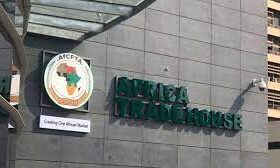Ugandan startup: Emata has successfully raised $2.4 million dollars in seed funding.
- 12:07 pm
- October 18, 2023


LATEST POSTS
In this funding round, Emata, a Ugandan startup, received substantial backing from investors, including African Renaissance Partners, Norrsken Accelerator, and the Draper Richards Kaplan Foundation, along with contributions from angel investors such as Marcus Boström and Zephyr Acorn. Notably, in June 2022, Emata was selected as one of nine African startups to participate in the Norrsken Impact Accelerator program.
The agricultural sector is a significant contributor to sub-Saharan Africa’s economy, accounting for 23% of the region’s GDP. However, the potential impact of agriculture on the GDP could be even greater if small-scale farmers had improved access to essential resources. Currently, there exists a substantial $240 billion agricultural finance deficit in Africa, which forces many farmers to rely on high-interest bank loans.
Emata aims to address this financial gap by offering loans to small-scale farmers without the requirement for collateral. They achieve this by collaborating with cooperatives and farmer-focused organizations to facilitate the automated provision of loans. These partnerships also play a crucial role in the loan recovery process, ensuring that the funds are repaid by the farmers.
In essence, Emata is working to empower small-scale farmers in Africa by providing them with accessible and collateral-free loans, contributing to the growth and sustainability of the agricultural sector in the region. Their collaborations with cooperatives and organizations are instrumental in both providing these loans and ensuring their successful repayment.
The $2.4 million in seed funding comprises two key components:
Debt: Of the total amount, $1.6 million is in the form of debt. This means that Emata has borrowed this portion of the funding and will be required to repay it over a set period, typically with interest. This debt financing is a common method for startups to secure capital for expansion without giving away ownership stakes.
Equity: The remaining $800,000 is provided in the form of equity. Equity represents ownership in the company. Investors who contribute equity funding, often known as shareholders, become partial owners of the startup. This can involve sharing in profits and having a say in the company’s operations.
The primary objective of this seed funding is to enhance Emata’s operations in Uganda, where it is already active, and to lay the foundation for extending its services to Tanzania. By strengthening its presence in Uganda and entering the Tanzanian market, Emata can reach a wider network of farmers and offer them cost-effective loans. This expansion is critical for both the company’s growth and its mission to support and empower agricultural activities in the East African region.
In summary, Emata’s successful acquisition of $2.4 million in seed funding, comprising debt and equity, will enable the company to expand its affordable lending services for farmers in East Africa, with a primary focus on Uganda and future plans to enter the Tanzanian market. This financial support is essential for driving the company’s growth and enhancing its impact in the agricultural sector.
Other News


















